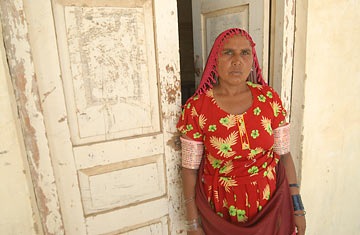
A former slave, Chandar Sabahi. "We were treated like animals," she says. "Anyone who refused to work was beaten up."
As Hillary Clinton pays her first visit to Pakistan as Secretary of State, an unfolding hostage crisis will test the Obama Administration's rhetoric on human rights in the region. Officials at the U.S. embassy in Islamabad say at least three landlords have held as many as 170 bonded farmworkers at gunpoint on their estates in the country's southeast Sindh province since late September. With U.S. attention focused on getting Pakistan to deal with huge security issues to Washington's satisfaction, will Clinton be able to press Islamabad's rulers to address a controversy involving rural poverty and modern-day slavery?
The crisis began after the workers' advocates successfully petitioned three district courts to declare as illegal the debts that the landlords were using to compel the workers into indentured servitude. Those debts average around 1,000 Pakistani rupees — roughly $12. The hostages, a third of whom are children, some as young as 4 months old, are landless peasants, known as haari in Urdu. According to Ghulam Hyder, a spokesman for Pakistan's Green Rural Development Organization, the landlords have killed one hostage already and are threatening to kill the others unless they drop the cases and return to work. The landlords also abducted Amarchand Bheel, an advocate for the laborers, as he traveled to court to plead their cause.
A 2004 study by the International Labour Office (ILO) estimated that there are up to a million haari families in Sindh alone, the majority living in conditions of debt bondage, which the U.N. defines as modern-day slavery. Last fall, Pakistan's Daily Times newspaper quoted the labor minister of neighboring Punjab province as saying that landlords hold millions of forced laborers in "private prisons" across the country.
While the nation's 1992 Bonded Labour System Act mandates five-year sentences for violators, Pakistani officials have yet to record a single conviction. "The police are turning a blind eye on the issue," says Hyder, though he acknowledges that police in one of the districts acted successfully, in response to a court order, to free more than a dozen of the hostages. However, bonded families rarely press their rights because of the overwhelming influence of the landlords in local politics, the threat of retaliation and their families' dependence on the landlords for survival.
The crisis has caused alarm in the U.S. State Department, as Clinton's first visit comes at a delicate moment in the ongoing war in neighboring Afghanistan. When told about the crisis on Friday in Washington, Richard Holbrooke, U.S. special representative to Afghanistan and Pakistan, immediately called the Pakistani ambassador to the U.S. to express his concern. As they prepare for Clinton's visit, American diplomatic officials in Pakistan have pressed the Sindh Home Secretary and the Pakistani Ministry of the Interior to resolve the crisis swiftly. "We are concerned about the situation and working with NGOs and the relevant Pakistani officials to address it," said Anne Patterson, the U.S. ambassador to Pakistan.
This year, the State Department downgraded Pakistan to the Tier Two Watch List in its annual report on human-trafficking. Under a new U.S. law, a country ranked on that list for three consecutive years will automatically be downgraded to Tier Three, where it could face sanctions.
"Debt bondage is not a relic of history; it continues to exist in communities in South Asia," said Luis CdeBaca, President Obama's ambassador-at-large to monitor and combat trafficking in persons. "We are exploring ways we can help Pakistan to confront the scourge of captive workers, to deliver freedom for these workers and realize the promise of Pakistan's 1992 emancipation law."
